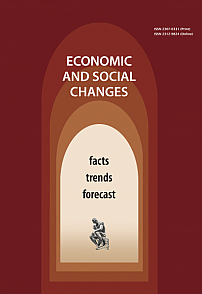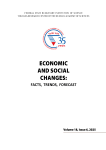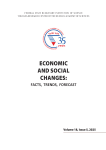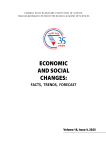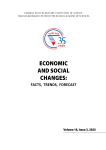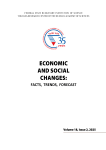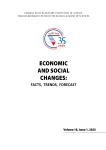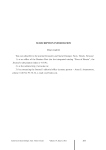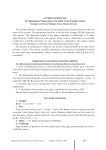Economic and Social Changes: Facts, Trends, Forecast @volnc-esc-en
Economic and Social Changes: Facts, Trends, Forecast
Coverage and indexing of the journal in Russian and foreign databases: Web of Science, ESCI, VAK RF, CrossRef, DOAJ, EBSCO, Google Scholar.
The journal Economic and Social Changes: Facts, Trends, Forecast was founded in 2008. Publication frequency since 2011 – once every two months (six times a year).
According to the Decision of the Ministry of Education and Science of the Russian Federation, the journal Economic and Social Changes: Facts, Trends, Forecast is on the List of peer-reviewed scientific journals and editions that are authorized to publish the principal research findings of doctoral (candidate’s) dissertations in scientific specialties: 08.00.00 – economic sciences; 22.00.00 – sociological sciences.
The major goal of the Journal is to provide the global scientific community and practitioners with an opportunity to publish their research findings on socio-economic processes, to get acquainted with different points of view on relevant issues of economic and social development, and to participate in discussions on these topics.
The Journal publishes original papers and reviews that analyze and forecast changes in economy and social sphere of various countries, regions, and local areas. Main topics are as follows: development strategies of territories, regional and sectoral economy, social development, formation of budget revenues and rationalization of expenditures, innovation economy, and economic theory.
Vologda Research Center of the Russian Academy of Sciences
Выпуски журнала
Статьи журнала
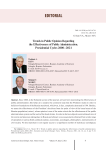
Статья научная
Since 2008, in the Editorial section of the journal, we have been monitoring the effectiveness of public administration; this helps us to analyze the consistent steps that the President makes in order to build new foundations of the Russian statehood, which was, in fact, completely destroyed in 1991. Besides, we assess the effectiveness of the President’s decisions from the point of view of the broad strata of the Russian population (voters), whose opinion is one of the main criteria for the effectiveness of the public administration system and the work of the head of state. In order to form an objective and unbiased view of the events and processes taking place in Russia and abroad, we use assessments obtained from a wide range of specialists in various fields: political analysts, economists, sociologists, philosophers, representatives of civil society. No less important is our regular access to a significant number of statistical, sociological, Russian and foreign databases; by using them comprehensively, we can look at the situation in the country and assess the effectiveness of public administration from the point of view of not only individual experts, but also voters. The main information source of sociological data in our research is the public opinion monitoring that we have been conducting in the Vologda Oblast since 1996. Regularly, once every two months, we carry out a survey covering 1.5 thousand residents of the region, thus obtaining an average annual “cross-section” of public opinion based on the estimates of nine thousand voters representing the main social strata and groups that differ in income, territory of residence, employment, marital status, education and many other socio-demographic characteristics. Due to a monitoring nature of the research, we can observe how, in the course of time, the events and decisions taken by the head of state are lined up in a clear, consistent, logically verified line, which many experts can see. But the majority of voters who observe “with the naked eye” the situation in the country and the actions of the authorities, do not see this line, because it is perceived on a subconscious and routine level, that is, based on the general opinion prevailing in their environment and stereotypes that people develop through their own life experience, the experience of relatives and friends (including negative life experience of the 1990s). This is why our editorial articles often supplement the analysis of latest events and processes in Russia and abroad with a retrospective look at the management decisions that preceded them. We pay special attention to the principle of historicism, and in this regard it is important for us to build a chronology of events. The current article is the last one in 2021; it briefly summarizes the analysis of public administration effectiveness in the context of Vladimir Putin’s presidential terms, with an emphasis on the first four years of the fourth presidential cycle (2018-2021).
Бесплатно
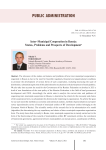
Inter-municipal cooperation in Russia: status, problems and prospects of development
Статья научная
The relevance of the studies on features and problems of how inter-municipal cooperation is organized in Russia is due to the need for favorable regulatory, financial and organizational conditions to promote the development of various forms of such cooperation, including increasing the scale of distribution, substantiating the role of this administrative mechanism in the development of municipalities. We also take into account the need for the Government of the Russian Federation to develop in 2021 a draft of new foundations of the state policy of the Russian Federation in the field of local government development until 2030. Accordingly, the article aims to analyze the current state and problems of organizing inter-municipal cooperation in Russia, to determine the criteria for the necessity and choice of the cooperation form, to substantiate the directions for improving its organization. To achieve the goal, we use such scientific methods as economic and statistical analysis, methods of generalization and expert survey (questionnaire survey of heads of municipal entities of RF constituent entities belonging to the European North of Russia). The scientific novelty of the research lies in the substantiation of a model (algorithm) for determining the very expediency and choice of inter-municipal cooperation organization form. The study shows that currently in Russia, inter-municipal cooperation is mainly carried out in the form of the functioning of the councils of municipalities within RF constituent entities, the conclusion of framework agreements, agreements between municipalities on mutual action, coordination of efforts, and implementation of joint activities. Only 2.8% of the total number of municipalities in the country participate in cooperation most closely (establishing inter-municipal organizations). We have developed appropriate recommendations to the authorities to eliminate the existing obstacles and problems in the development of inter-municipal cooperation. The results of the conducted research can be used in the activities of federal, regional public authorities, local government bodies, and serve as a basis for further research on improving local management system.
Бесплатно
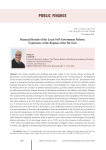
Financial results of the local self-government reform. Experience of the regions of the Far East
Статья научная
The article examines the problems and main results of the 30-year reform of local selfgovernment, concerning the positioning of the institution of LSG in the “vertical of power”, the definition of the structure of powers and rights, and the formation of the financial base of LSG. The purpose of the work is to determine the basic principles and features of the development of the LSG institute and its financial interaction with the state on the example of municipalities of a large macro-region, which is the Russian Far East. In order to identify statistical patterns, general scientific methods were used based on official data from the Federal Treasury of the Russian Federation, the Ministry of Finance, Rosstat, regional authorities and local authorities of the Far Eastern constituent entities of the Russian Federation. The analysis of the dynamics of changes in the spatial classification of municipalities of the Far East over the years of reform, as well as the state and conditions for the formation of budgets of municipal districts and urban districts of the Far Eastern constituent entities of the Federation for 2011-2019 is carried out. It is shown that in the Far East the situation with the financial security of local self-government is determined not so much by local or Far Eastern, as by all-Russian tendencies. Revealed the presence of a serious stagnation of revenues and expenditure of the municipalities of the Far East; the prevalence of low financial independence of the budgets of the civil society and, especially, of the municipal districts; a decrease in the possibility of free disposal of budgetary resources for municipalities of the Far East, since during the analyzed period the share of grants-in-aid in the revenues of the budgets of municipal districts decreased by 8.6 percentage points, up to 15.9%, and in the revenues of urban districts - to 1.8%, with an increasing share of subventions and subsidies in budget revenues. In general, over the years of reform, the legislative strengthening of the powers and rights of LSG, declared at the federal level, has not received adequate financial support in the region. Proposals for improving the financial component of the LSG reform in the framework of the evolutionary approach have been substantiated. It is shown that constitutional changes, while remaining formally neutral to LSGs, will require clarification of federal legislation for their implementation, which can give rise to a number of latent threats and undermine the principle of organizational isolation and financial independence of LSG bodies. The novelty of the research task is actualized by considering the aforementioned range of issues in comparison of federal trends and the situation in the macroregion under the conditions of changes in the Constitution of the Russian Federation and an increasing understanding of the need to strengthen the financial base of LSG. The materials of the article can be used in the educational sphere and in the activities of public authorities and LSG.
Бесплатно
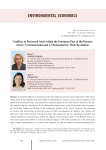
Статья научная
It would be difficult to overestimate the role of protected areas in the conservation of the Arctic nature. Due to their fragility and vulnerability to anthropogenic impacts, Arctic natural complexes need special and stricter protection. The importance of preserving the nature of the Arctic is also due to the fact that maintaining the environment in an undisturbed natural state is one of the main ways to preserve the traditional culture and lifestyle of the indigenous peoples of the North. However, the processes of creation and functioning of protected areas are often accompanied by conflicts; this reduces the efficiency of the entire network of protected areas. The article uses our own algorithm to identify and classify conflicts in protected areas within the regions of the European part of the Russian Arctic. In total, we revealed 138 conflicts in 21.6% of protected areas; 70.3% of the conflicts are in the most acute stage of open confrontation. As a result of the research, we have developed a universal mechanism for resolving conflict situations in protected areas. The mechanism is of a closed nature and includes the following implementation stages: setting a goal; analyzing conflicts that arise during the creation and functioning of protected areas; identifying stakeholders and their interests; identifying the subject and stage of the conflict; arranging the work of a platform for coordinating the interests of stakeholders; taking into account the priority of sustainable development in the territory; setting specific tasks and choosing conflict resolution tools; monitoring conflict situations in protected areas. We believe that the implementation of the proposed mechanism will ensure a balance of interests of the local population, economic entities, authorities and other interested parties, and will also contribute to sustainable socioi environmental and economic development in protected areas and in adjacent territories as well.
Бесплатно

